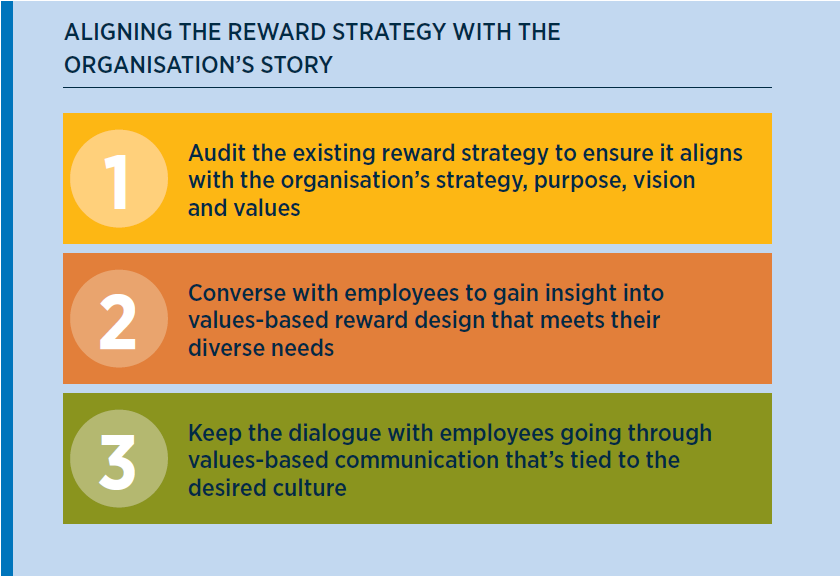
It’s the key to a meaningful employee experience (EX) that creates a sense of belonging for an increasingly diverse workforce. And a values-based reward strategy has a crucial role to play.
Reward no longer revolves around pay, bonus and pension alone. It’s also about being responsible. Employers that nurture a culture of inclusion, fairness and flexibility — measured in terms of working time, learning and support — will help their employees feel good about who they work for. When people look forward to their work and bring their best selves to their job, they’re engaged and motivated to make a difference.
In short, this is a shift away from market individualism to something much more values based. Something more socially aware.
To get there, organisations need to start with a clearly defined strategy, purpose and vision. And a set of values that people want to buy in to. This ‘story’ comes from the top and is told with an authentic voice. Most important, employees will only listen and participate if it plays out in everything the organisation does and says, including how it rewards people. Living up to this is vital — employees are watching carefully and so is future talent.
Making the story real with an aligned reward strategy
An effective reward strategy sustains the power of the organisation’s story. Auditing the existing strategy ensures alignment with the overall strategy, purpose, vision and values, while making it integral to the EX. Every step of the way it’s important to think ‘values-based reward’. What is the right and fair thing to do? Can the organisation justify the action or decision?
Employees are the main characters in any employer’s success story. Conversing with them and actively listening helps to establish expectations, and informs design decisions for a values-based reward programme that meets the needs of a diverse workforce.
Conversation with people should then become an ongoing dialogue, backed by values-based communication that’s tied to the desired culture. Working harder to keep the plot line front and centre helps everyone stay on the same page, especially in a remote working environment.
Organisations that bring out their better with regards to values based reward will have the differentiator they need in today’s competitive environment. Not to mention the key to unlocking discretionary effort.

The future of work: anytime, anywhere, any place?
Technological advancements and a commitment to innovation in flexible working — both driven forward at breakneck speed by the pandemic — have ensured an explosion in talent mobility. Location is no longer a limitation for many employee roles. For organisations, that means the world has gotten a lot smaller. And a whole lot more competitive.
In this new environment, the employee value proposition (EVP) has to stack up. How organisations show up in the markets they serve is really important for each pillar of success: people, customer and community.
An intensified need for values-based reward
Unfortunately, some organisations haven’t been covering themselves in glory where reward is concerned. And in very public ways, the pandemic has only served to highlight instances where they fall short.
Executive pay transparency was already under the microscope thanks to the introduction of pay ratio regulations and the requirement to start publicly reporting from 2020.1
The societal spotlight is also on recognition programmes, as well as positive stories such one-off bonuses being awarded to key workers in various industries. But negative decision and actions haven’t avoided the spotlight. The government’s failure to recognise nurses in the most recent budget went down like a lead balloon.
Meanwhile, 2020 saw a huge amount of media focus on distributive justice, with regards to race in particular, as well as gender pay and some high-profile equal pay rulings. In short, there’s now a huge interest in how organisations are responding to societal issues.
Responding to societal change with proactive vs. reactive reward strategies
Firstly, reward strategy is much less about negotiating with unions about legal obligations. It’s much more about what feels like the right thing to do.
Equally though, it shouldn’t be a knee-jerk reaction to the latest social media debate. That’s the route to short-term gain with the unintended consequences of long term-pain. Isolated policy changes end up sitting at loggerheads with other aspects of the reward offering — connected but clearly not aligned. The upshot? Further disjoints in the EX.
Any changes made should be purpose led and values driven. Their impact on connected policies needs to be investigated and addressed too. For example, some organisations replaced overtime with agile working in 2020; the ability to take time in lieu. But they risked overlooking the knock-on effect on buying and selling annual leave. Is the latter appropriate where massive amounts of ‘in lieu’ time might be building up?
Secondly, it’s important to bear in mind that many organisations are rewriting their business strategy to reflect the massive shift over the last 12–18 months as a result of the pandemic. In light of this, the existing reward strategy might not be relevant anymore.
There’s already a trend towards organisations recognising that needs for time off go beyond annual or parental leave. Options like sabbaticals or volunteering are becoming more relevant, especially for younger generations, because they provide opportunities to grow and learn through non-professional means. The 11% that offer the chance to volunteer through charity days are on to something — these experiences can help people bond with each other and their organisation over a common cause.2
Right now, last but not least, many organisations are focusing more on introducing people to new ways of working than returning them to work. Trends observed besides remote or hybrid working arrangements include working shorter or flexible hours.2
More and more employers are also looking into the idea of the four-day work week — a trend to keep an eye on as the post- COVID economy begins to take shape.3
Some big organisations have already publicly stated that working from home represents their key strategy to attract talent, enhance productivity and improve wellbeing. And others have said that it’s not sustainable for them as collaboration and culture will take too big a hit. Findings from one survey validate these concerns about the disengaging effects of remote work, linking it to 17% lower productivity and 24% higher turnover.4
This debate has really only just started, but employees have wanted and needed more work flexibility for some time. The pandemic just revealed how much.
Whatever else employers do to reward their people, flexibility will be key to attracting talent. They will stand out and get noticed for doing the right.
1. GOV.UK, ‘New executive pay transparency measures come into force’, January 2019
2. Gallagher, ‘Benefits Strategy & Benchmarking Survey — UK Edition’, October 2020
3. Raconteur Media, ‘Future of the Employee Experience’, July 2020
4. Gallup, ‘Remote Work: Is It a Virtual Threat to Your Culture?’, August 2020



